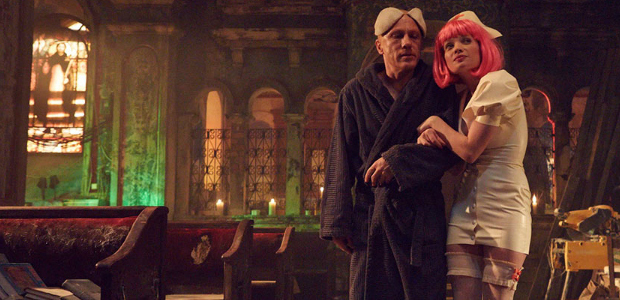The often underfunded yet always fascinating Terry Gilliam dives back into dystopian drama with The Zero Theorem. Its central story of an outsider fighting against the oppression of a smothering society is one we've seen before in Brazil and Twelve Monkeys. But splattered in a vivid color palette and rich with irreverent details that sneer at everything from the Christian faith to our obsession over superheroes, Gilliam's latest dystopian tale feels fresh and necessary.
Christoph Waltz stars as Qohen Leth, a neurotic computer hacker who refers to himself in the royal we, rejects common pleasures--from junk food to sex--and waits impatiently for his calling. More specifically, he desperately wants an actual phone call that he believes will give his life meaning. His quest to earn this call brings him into the realm of the manipulative Management (Matt Damon), an ennui-ridden wunderkind named Bob (Lucas Hedges), and a latex-loving call girl called Bainsley (Mélanie Thierry).
Qohen's existential crisis is heavy. Yet The Zero Theorem is light with an iconoclastic humor and beguiling bubbliness. As we've come to expect from Gilliam's works, every frame is packed with quirky details that inform his distinctive dystopias, and often contemptible but always compelling characters. The production design alone for The Zero Theorem could entertain. For instance, a scene where Qohen goes before a panel of doctors includes one doctor played by Peter Stormare, who examines the naked and anxious hacker while wearing exam gloves that have had the finger tips snipped off! It's a nonsensical world that refuses to acknowledge its own lack of sense, and so it pulls us into Qohen's feeling of being lost.
To be honest, I could gush about the postmodern collage of Gilliam's design--from deconstructed religious statues to cheeky porn sites and a stalker-inspired approach to advertising--for hours. Hours. But I'll limit myself by saying that fans of Gilliam's animation and artful eye will positively revel over The Zero Theorem. Gilliam stuffs his film with outlandish eye candy and deranged visuals, unfurling it all in thoughtful cinematography that in turns shocks and titillates. After decades of watching him craft incredible films with budgets that would be laughable to most ambitious filmmakers, the euphoria he creates with this dazzling and demented drama should come as no surprise.
His reputation has helped land The Zero Theorem an incredible cast. As Qohen, Waltz harbors a painful longing for purpose so beautifully that he is riveting to watch whether he's panicking over a dysfunctional computer system, frolicking with the lovely Bainsley, or executing a jolting pratfall. Thierry is a dream girl who at first seems like a heady promise of candy and sex. But subtly, and with spunk, she shapes her hooker with a heart of gold into more than a sultry stereotype.
There are also a slew of thrilling but brief turns from Peter Stormare, Ben Whishaw and Gwendoline Christie, to David Thewlis and Matt Damon. Tilda Swinton--who has offered nothing but insanely enthralling cinema this year from Only Lovers Left Alive to Grand Budapest Hotel and Snowpiercer--delivers a daffy and welcomed turn as a computer-generated psychiatrist. Yet it's young Lucas Hedges who proves the unexpected scene-stealer here.
Hedges previously played a menacing boy scout in Wes Anderson's Moonrise Kingdom. As Bob he is Qohen's unlikely ally in his battle to find his purpose. Radiating with the impatience of youth and the itch of teen angst, Bob adds a jolt to the narrative and becomes a source of surprising yet satisfying sage advice. It's the kind of role that could feel schticky or sentimental in the wrong hands. But Hedges holds his own against the star power that is Waltz, while delivering heady dialogue--slick with lingo and attitude--with aplomb.
Your Daily Blend of Entertainment News
Ignited by performers clearly giddy to play in Gilliam's sandbox, The Zero Theorem is electric, full of thought-provoking concepts and dazzling imagery. At its core is a story that's bittersweet yet boldly funny. It's bonkers and brilliant, folding in pop culture icons with classical influences. Daring us to empathize with a dreamer the film repeatedly declares mad. And for all this, The Zero Theorem is a masterpiece of Gilliam's style and substance.
Staff writer at CinemaBlend.


